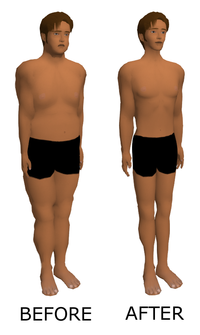
Photo from wikipedia
BackgroundThe effect of an exercise program on the body composition, muscular strength (MS), biochemical markers, and bone mineral density (BMD) of individuals undergoing gastric bypass is unclear. We assessed lean… Click to show full abstract
BackgroundThe effect of an exercise program on the body composition, muscular strength (MS), biochemical markers, and bone mineral density (BMD) of individuals undergoing gastric bypass is unclear. We assessed lean mass (LM), MS, bone remodeling markers, and BMD before and after supervised weight-bearing and aerobic exercise training in obese patients who underwent Roux-en-Y gastric bypass (RYGB).MethodsThis study included 37 obese patients (81.1% women, mean age 38.2 years, mean body mass index 42.4 ± 0.5 kg/m2). Whole body densitometry was used to evaluate pre- and postoperative BMD, total body fat, and LM. Serum calcium, parathyroid hormone, 25-hydroxyvitamin D, and bone remodeling markers were measured. MS was determined through the concentric 10 repetition maximum test. Postoperatively, participants were divided into two groups: the training group, who followed an exercise program (TG, n = 18), and the control group, who did not (CG, n = 19).ResultsAfter 1 year, the TG showed a lower decrease in total BMD and at the lumbar spine and right hip compared with the CG (p < 0.001). The TG had lower mass reduction and an increase in upper limb LM compared with the CG (both p < 0.05). There was no significant difference between groups in bone markers or calcium metabolism. MS was higher in the TG than the CG (p < 0.05).ConclusionThe supervised exercise program attenuated lumbar spine and right hip BMD loss and improved LM in the arms and overall MS but did not affect bone remodeling.
Journal Title: Obesity Surgery
Year Published: 2017
Link to full text (if available)
Share on Social Media: Sign Up to like & get
recommendations!